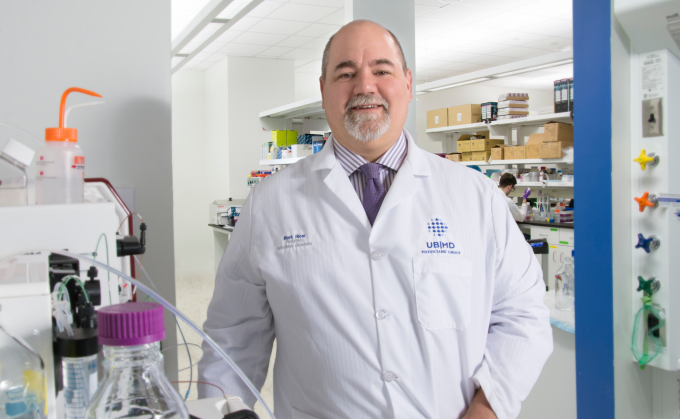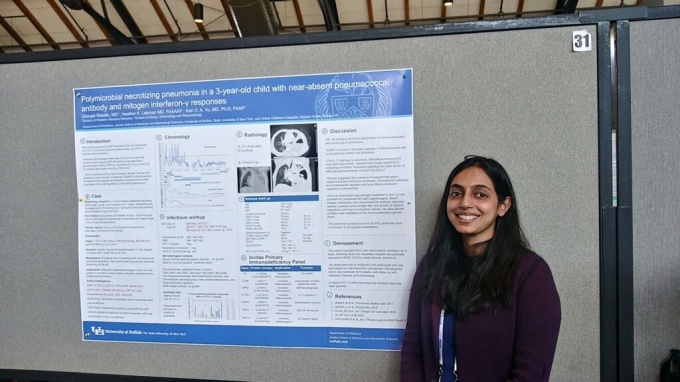Research and Scholarship

Fellows in our program will establish a path forward to becoming a national or international expert in their chosen field within Pediatric Infectious Diseases.
Our goal will be to fulfill the ABP requirement of the scholarship work product, and to exceed this level to establish a track record of scholarship in a topic that can be the basis for your future work. A strong record of scholarship during fellowship will establish a record of success that optimizes the ability to obtain future grants and academic faculty positions.
Guided by an individual faculty mentor, you will be exposed to a rich variety of patients and medical technologies that lend themselves to the asking and answering of essential questions in the field of pediatric infectious diseases.
Enjoy Comprehensive Options
Utilizing the infrastructure within the division, department and university, all research options (basic bench research, translational research, epidemiologic and clinical studies and clinical trials) are available to you.
Within our division, there are numerous opportunities available touching on topics dealing with multi-drug resistant bacteria, phage therapy, pediatric immune responses, COVID-19, Kawasaki disease, antibiotic stewardship, infection control practices, congenital CMV, Hepatitis C exposed infants, and vaccine trials. Studies have a variety of support, including PI directed, NIH supported, international registry collaborations, statewide collaborations, and industry sponsored.
You will have access to the resources within the Clinical and Translational Research Center (CTRC), located on the same Buffalo Niagara Medical Campus as Oishei Children’s Hospital. The CTRC houses the opportunities provided by the NIH supported Clinical and Translational Science Institute.
Individualized Mentoring
You will be mentored by a faculty mentor here at the University at Buffalo. Meeting with the divisional program director, a committed mentor will be selected from the faculty at the University of Buffalo that will optimize your future success. Your progress will be tracked by a Scholarship Oversight Committee as well that will evaluate your working relationship and project progress during your fellowship. Members of the division will be on your SOC and are often the mentor to fellows, but a primary mentor is not required to be from the division.
We have attempted to maximize your success by providing almost two full years to concentrate on scholarship if an academic career is your goal. The goal of the first year is to choose a track (clinical, translational, basic science), identify a mentor and members of their Scholarly Overnight Committee (SOC), develop a research plan and submit an Institutional Review Board proposal.
The second year is devoted to data acquisition and analysis, incorporating SOC feedback, and creating an initial work product. The third year is concentrated on building on this scholarship and preparing the submission of a major grant, with NIH K level being the prototype.
Present Your Findings, Attend Conferences

You will be encouraged to present your findings at any number of conferences available that will optimize your success. Typically, these would include ID week or St. Jude’s -Pediatric Infectious Diseases Society Research Conference.
As part of your fellowship, you have available GME discretionary funding available to support or reimburse expenses so you can attend conferences to stay current on the latest scholarship and developments in our field.
Grant Preparation
For many academic Pediatric Infectious Disease physicians, grant preparation is an important aspect of their work. The NIH has a variety of resources that can be used for this pursuit. As part of your training, you will be expected to complete a major grant application, ideally targeting career development, with typical projects falling under the K08 or K23 mechanisms.
Other grants are available at all levels of training.
Get Connected to National and International Resources
We will financially support our fellows to take advantage of the societies available to them. This includes joining Pediatric Infectious Diseases Society, Infectious Diseases Society of America, the junior section of SPR and the local American Society for Microbiology. Others that may benefit your future career can also be supported by the fellowship program or by your own CME funds depending on the case.